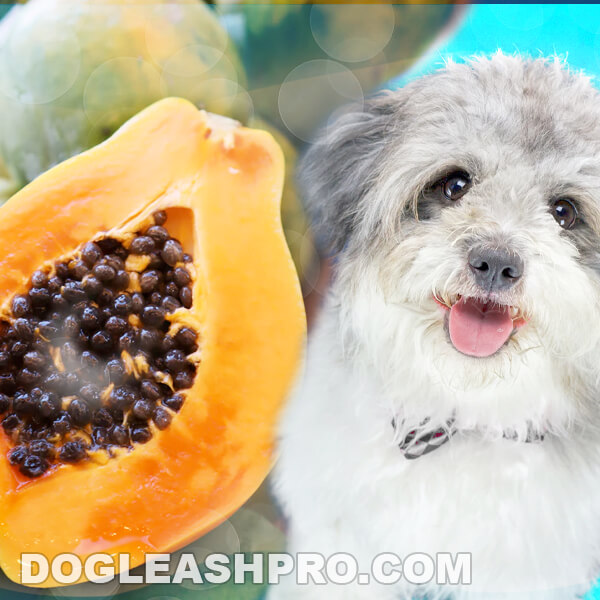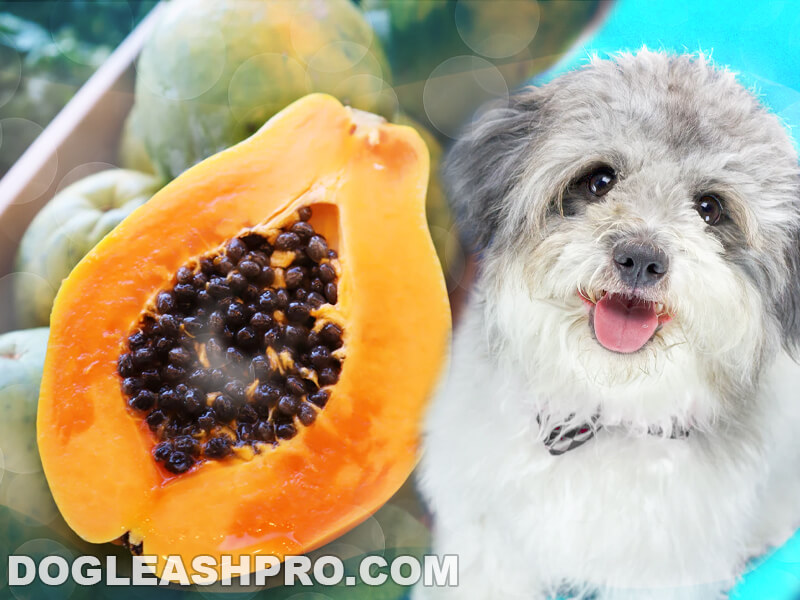
Can dogs eat Papaya? Yes, dogs can eat Papaya in moderation as this fresh, sweet, and soft fruit is packed full of fiber, vitamins, minerals, and healthy enzymes that can be beneficial to our canine friends. However, proper preparation is key so before feeding your dogs Papaya, be sure to remove the Papaya seeds as they are toxic to dogs.
Papaya is an exotic fruit that is juicy and sweet. The flesh of the Papaya fruit is reddish-orange, similar to the color of apricots. Many enjoy eating it by using a spoon or chopping it into small pieces. However way you enjoy it, you’re probably thinking about sharing it with your canine friends. But is Papaya safe for doggy consumption? Let’s find out!
Table of Contents
Can dogs have Papaya?
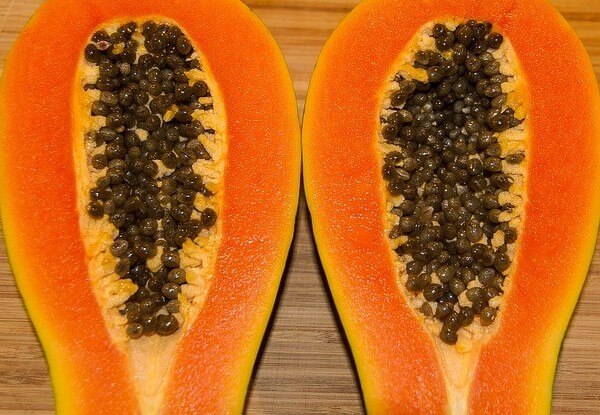
Yes, dogs can have Papaya. The sweet bright orange flesh of the Papaya fruit contains tons of vitamins, fiber, minerals, and healthy enzymes that are beneficial for our canine pals. Let’s dig deeper into the health benefits of eating a little bit of Papaya for dogs.
Is Papaya good for dogs?
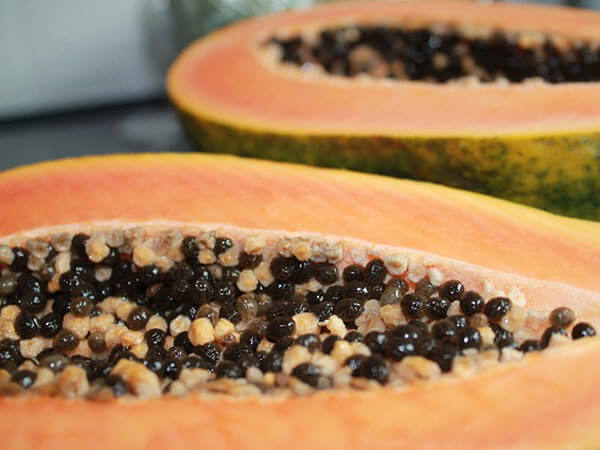
Yes, Papaya is good for dogs. Let’s take a look at the health benefits of Papaya for dogs.
Papaya contains vitamins that are vital to dogs
You can expect the following vitamins in Papaya: vitamin A, C, E, K, and vitamin B9
Vitamin A is an antioxidant that supports eye health in your furry friends. It’s not surprising that our four-legged friends have night vision and can see in the dark. With enough vitamin A, it can help them maintain and improve their night vision.
If your pooch is breeding, pregnant, or nursing their pups, offering them a bite or two of Papaya may give them an extra boost of vitamin A support that they will need.
Vitamin C is another antioxidant that attacks harmful free radicals to prevent cell aging in dogs. It also helps to reduce inflammation in dogs. While the dog’s livers make their own vitamin C, it doesn’t hurt to offer your pups some Papaya for an added boost.
Vitamin E is a fat-soluble vitamin that helps with fat metabolism and cell functions. It also helps defend your cells against oxidative damage. If your dog lacks vitamin E, he or she may have reproductive problems, muscle degeneration, and eye degeneration.
Vitamin K is another fat-soluble vitamin that is essential in preventing bleeding issues by helping the blood clot.
Folate or vitamin B9 in Papaya promotes strong immune function and normal blood formation in dogs. It is a water-soluble that helps with the following:
- Cell division: produce DNA and other nucleic acids, promote fast cell growth in all stages of a dog’s life, from infancy to adolescents and even during pregnancy.
- Tissue growth: vitamin B9 takes the amino acids and uses them to build new proteins.
- Normal blood formation: Form blood cells in the dog’s bone marrow.
- Strong immune and heart function: Maintain normal blood levels of the amino acid homocysteine.
Fun Fact: Nectarines are nutritious fruits that contain fiber, minerals, and vitamins as well. But are they safe for dogs to eat? Check out Can Dogs Eat Nectarines? to find out!
Fiber in Papaya promotes a healthy digestive system in dogs
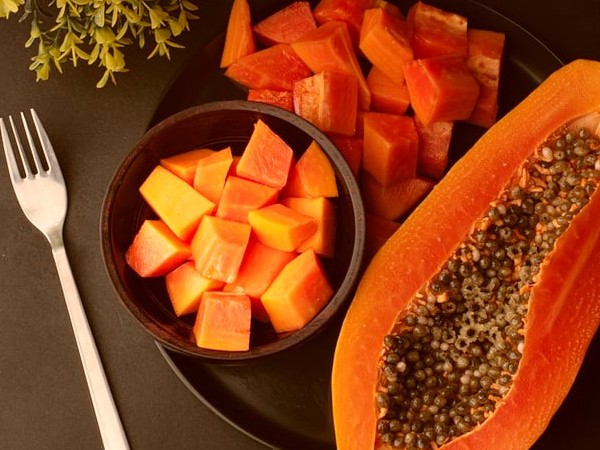
Your four-legged friends need fiber to have and maintain a healthy digestive system. The good bacteria in your dog’s intestines use fiber and ferments it into fatty acids, which helps keep the level of good and bad bacteria balance in the digestive tract.
If your dog is feeling sick and has diarrhea, feeding them two or three small slices of Papaya may be helpful. The fiber in Papaya helps to absorb excess water and add bulk so the stool is firmer and formed. Your dog will have a regular bowel movement again thanks to the fiber intake from Papaya.
DON’T MISS: Can Dogs Eat Jackfruit?
Potassium in Papaya promote strong muscle and growth in dogs
Potassium is an electrolyte your dog needs for healthy muscles, nerves, and heart function. It allows your dog’s muscles to relax and contract. With sufficient potassium, your furry friend will have optimal organ function of the liver, kidneys, and heart.
Calcium in Papaya provides dogs with healthy and strong bones and teeth
Adding a little bit of Papaya to your dog’s diet can provide your pooch with strong teeth and bones. Additionally, calcium helps promote healthy coats and nails and can even improve their nervous system.
But, is Papaya good for dogs with flatulence problems? Let’s find out!
Can dogs eat Papaya enzymes?
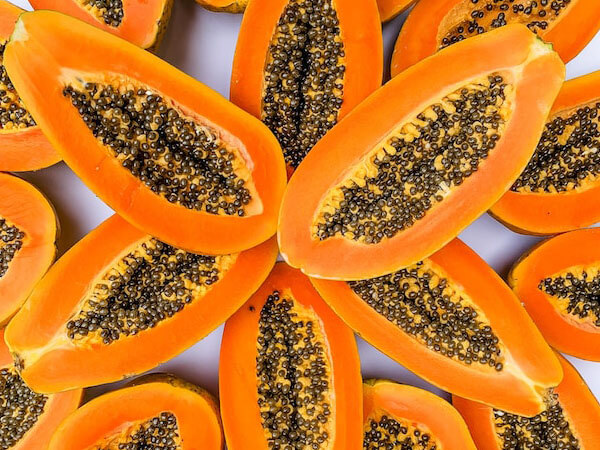
Yes, dogs can eat Papaya enzymes. Can dogs have Papaya enzymes? Yes, if your furry family member is currently suffering from digestive disorders or has flatulence problems like farting or passing gas a lot, having Papaya enzymes can help.
Papaya contains an enzyme called papain which is a blood-clotting agent that can help to stop bleeding. The papain enzyme in Papaya can help destroy intestinal worms in dogs as well. Additionally, Papaya enzymes can aid in the digestion of proteins in meat, milk, and eggs.
So if you’re wondering, “Can I give my dog Papaya enzyme?” the answer is yes. However, you should always consult with your vet first before introducing any new food to your pup. If your pooch is experiencing any digestive disorder or flatulence problem, ask your vet for the best treatment and if Papaya can help.
CHECK OUT: Can Dogs Eat Pomelo?
Is Papaya safe for dogs?
Yes, Papaya is safe for dogs when consumed in moderation, and if your furry friends are healthy. Is Papaya safe for dogs to eat? Only if your dogs eat the sweet soft flesh of the Papaya. The flesh of this sweet juicy fruit contains several health benefits that are great for dogs.
Pet owners should remove the Papaya seeds and the Papaya skin first before feeding it to their pups. If not, Papaya can be bad for dogs. Let’s explore further how Papaya can be bad for dogs next.
Is Papaya bad for dogs?
Yes, Papaya can be bad for dogs. There are several reasons why. Read the next section to find out.
Papaya and dogs
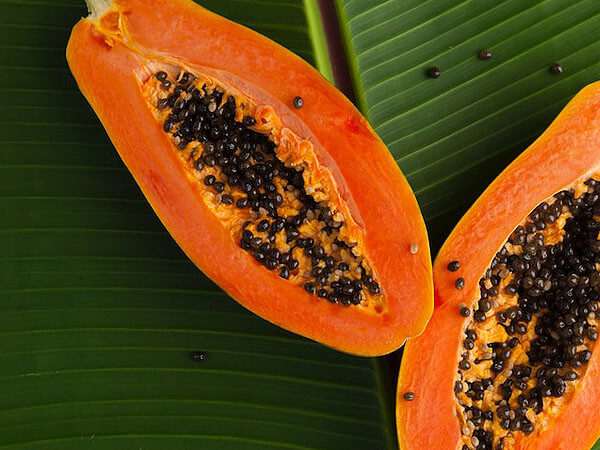
Can dogs eat Papaya seeds?
No, dogs should not eat Papaya seeds. Let’s find out! Here are some reasons why.
Papaya seeds contain cyanide which is toxic to dogs
When it comes to feeding your dogs fruit that is canine-friendly, it’s always recommended that dog owners remove the seeds first from the fruit first before feeding the flesh of the fruit to their canine family members.
The same applies to the seeds of the Papaya fruit. Are Papaya seeds poisonous to dogs? Yes, Papaya seeds are poisonous to dogs because they contain small traces of cyanide. If your pooch accidentally consumes a lot of Papaya seeds that were not removed from the flesh, they are at risk of cyanide poisoning.
Signs and symptoms of cyanide poisoning include:
- Difficulty breathing.
- Panting or breathing very hard.
- Salivation or drooling excessively.
- Bright red gums.
- Convulsions or shaking uncontrollably.
- Seizure.
- Suffocation.
- Paralysis.
If you suspect your canine friend has cyanide poisoning, contact your dog’s vet as soon as possible as this requires immediate medical attention. Time is of the essence here.
Thankfully the Papaya seeds have a bitter taste that dogs generally don’t like so this may deter your furry pups from eating it.
Fun Fact: An exception to this rule is if you’re feeding your four-legged friends dragon fruit. The seeds in dragon fruits are not only safe for doggy consumption, but they also provide health benefits to dogs. Check out Can Dogs Eat Dragon Fruit? to find out how this superfruit can help your dog’s health.
Papaya seeds can be a choking hazard in dogs
Although Papaya seeds may look relatively small compared to seeds of drupe fruits like apricots, they can still be a choking hazard in dogs. The Papaya seeds can get lodge in your dog’s tiny throat or may even get stuck in your dog’s intestines causing intestinal blockage.
In severe cases, intestinal blockage or bowel obstruction may require emergency surgery.
How about Papaya skin? Is it dangerous for dogs? Let’s find out next.
Can dogs eat Papaya skin?
No, dogs should not eat Papaya skin.
First, the Papaya skin is very hard and since most dogs don’t chew their food before swallowing, the Papaya skin can get lodge in your dog’s throat or esophagus and become a choking hazard.
Second, even if your furry pals manage to swallow the Papaya skin, it can be difficult for dogs to digest the skin and they will experience an upset stomach or even vomiting.
Third, if enough of the Papaya skin is consumed, it can cause intestinal blockage and this would require an emergency visit.
So, can I give my dog Papaya? If you do plan to give your dog Papaya, make sure to remove both the thick Papaya skin and the seeds first and only offer your pup the sweet juicy flesh. Moderation is key because consuming too much Papaya can be harmful to dogs. Here are some reasons why.
Fun Fact: The skin of jicama is also toxic to dogs. Check out Can Dogs Eat Jicama? to find out what other part of the jicama plant is bad for dogs.
Papaya contains tons of sugar which are harmful to dogs
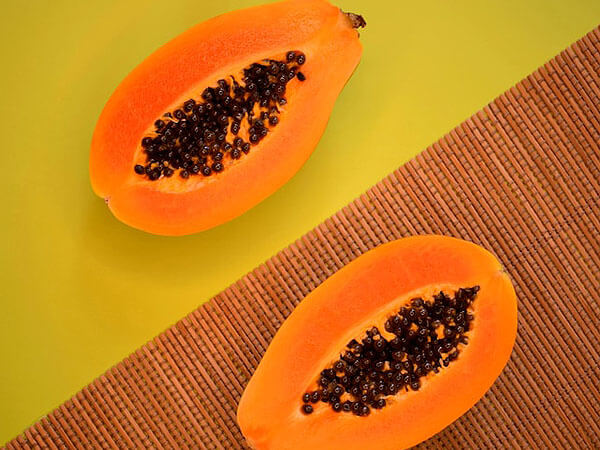
There are 18 grams of sugar in just one medium Papaya. That would be a lot of sugar for dogs. This is why our furry friends should only have Papaya in moderation. Eating too much Papaya means excessive sugar consumption which is not healthy for dogs.
Too much sugar consumption can put your furry friend at risk for weight gain, diabetes, dental issues, and even pancreatitis.
If you plan on feeding your pooch some Papaya, remove the Papaya skin and remove the seeds first. Then, chop this sweet fruit into small mouth-sized pieces and only allow your pup 3 or 4 small Papaya pieces.
If your dogs are diabetic, avoid feeding them any Papaya.
High fiber content in Papaya is also dangerous to dogs
Eating too much Papaya means consuming too much fiber which can cause upset stomach in dogs. In general, fiber is great for dogs as it can help promote a healthy digestive system in dogs and keep that stool firm and formed.
However, too much fiber consumption can also have a negative effect because it can cause fiber imbalance in dogs. This will make it hard on the dog’s body to absorb the necessary minerals from the food they ate.
Too much fiber intake can lead to symptoms such as:
- Going to the bathroom more often.
- Diarrhea.
- Strong urgency to defecate.
- Accidentally defecate inside the house.
RELATED: Can Dogs Eat Lychee?
Can dogs eat dried Papaya?
Yes, dogs can eat dried Papaya in small amounts and in moderation. Like fresh Papaya, dried Papaya also contains high sugar content so be careful with how much dried Papaya you’re feeding your canine friends.
Dried Papaya may be the result of the fruit getting dehydrated and this dehydration process may not sit well with the dog’s stomach and can cause gastrointestinal problems.
If this is the first time you’re feeding your dog dried Papaya, be sure to only feed them one or two small pieces and watch for any reaction. You can also consult with your vet and ask if dried Papaya is safe for your dogs to eat.
READ NEXT: Can Dogs Eat Prunes?
Can dogs eat raw Papaya?
Yes, dogs can eat raw Papaya in moderation, as it is a nutritious fruit that is rich in vitamins, minerals, and fiber.
Some of the key vitamins and minerals that can benefit a dog’s health include the following:
- Vitamin C: Contributes to immune function and may help reduce inflammation in dogs.
- Vitamin A: Supports healthy vision, skin, and immune function.
- Vitamin E: Acts as an antioxidant which protect cells from damage and support immune function in dogs.
- Vitamin K: Helps maintain proper blood clotting and bone health in your furry friends.
- Potassium: Essential for maintaining fluid balance, muscle function, and nerve signals in dogs.
- Magnesium: Supports nerve function, muscle contractions, and energy metabolism in dogs.
- Calcium: is needed for strong bones and teeth, nerve function, and muscle contractions in dogs.
When feeding your precious pup raw Papaya, make sure to remove the seeds and skin first before feeding it to your dog. This helps avoid any potential choking hazards or digestive issues.
RECOMMENDED: Can Dogs Eat Goji Berries?
Can dogs eat unripe Papaya?
It is not recommended for dogs to eat unripe Papaya, as it contains a higher concentration of latex. Consuming food that contains high latex content can cause digestive issues in dogs, such as diarrhea.
Therefore, it’s best to stick to ripe Papaya.
Can dogs eat green Papaya?
Green Papaya is unripe Papaya which means it contains a higher concentration of latex. When dogs consume a lot of unripe green Papayas, they may experience upset stomach and other digestive issues.
Instead of giving your canine friends green Papaya, opt for ripe Papaya.
CHECK OUT: Can Dogs Eat Mulberries?
Can dogs eat cooked green Papaya?
While cooking green (unripe) Papaya can reduce the latex content and potentially make it safer for K9 consumption, offering your dog ripe Papaya is way better as it poses fewer health risks.
If you decide to feed your dog cooked green Papaya, do so in moderation and monitor for any adverse reactions.
As always, consult your veterinarian before introducing new foods to your dog’s diet.
Can dogs eat ripe Papaya?
Yes, dogs can eat ripe Papaya. If the Papaya is too ripe, you can puree it into soups and pour a little over your dog’s regular meal. Is ripe Papaya good for dogs? Ripe Papaya contains just as much vitamins, minerals, and nutrients so it is just as good for dogs.
Is boiled Papaya good for dog?
Yes, boiled Papaya is good for dogs as well. You can boil the Papaya before feeding it to your dogs.
Can puppies eat Papaya?
Yes, puppies can eat Papaya in moderation too. Keep in mind the portion size when feeding your puppies Papaya since Papaya does contain high levels of sugar and fiber. When it comes to feeding your puppies Papaya, stick to one small piece.
Can dogs eat Papaya leaves?
No, dogs should not eat Papaya leaves, as there is limited information on their safety and potential effects on dogs.
While Papaya leaves are sometimes used for their medicinal properties in humans, it is best to avoid feeding them to your furry family members.
It’s best to stick to ripe Papaya fruit without the seeds, skin, and leaves. If you have any questions or concerns, we recommend that you speak with your veterinarian for guidance.
Can dogs eat Papaya peel?
Dogs should not eat Papaya peel, which is the outer skin of the Papaya fruit. Papaya peel can be tough and difficult to digest, potentially leading to gastrointestinal issues in dogs.
Always remove the peel (or skin) and seeds first before feeding ripe Papaya to your four-legged friends in moderation.
Can dogs eat Papaya pills?
No, dogs should not be given Papaya pills without consulting a veterinarian.
Can dogs have Papaya pills? Absolutely not if they aren’t recommended by your dog’s vet. Papaya pills are dietary supplements containing enzymes derived from the Papaya fruit. One example of the enzymes in Papaya pills is papain, which is believed to aid digestion in humans.
However, the safety and efficacy of these pills for dogs aren’t well understood. Therefore, dog parents must consult their veterinarian before administering any supplements to their dogs.
Your vet can recommend appropriate supplements and dosages tailored to your dog’s needs and health conditions.
Can dogs eat Papaya seeds for worms?
According to a recent research done by Adegbola Adesogan of the University of Florida’s Animal Sciences department, they found that Papaya seeds was a great way to help get rid of intestinal worms in goats.
Her team of researchers found that Papaya seeds were not only an inexpensive way to treat worms in goats, but also an effective treatment. When goats consume the Papaya seeds, the parasite eggs and adult count reduce substantially.
However not enough research has been done on Papaya seeds for worms in dogs. Therefore, we recommend that you consult with your veterinarian for appropriate deworming medication if they have internal parasitic worms.
Your dog’s vet will be able to recommend the right dosage specific to your dog’s needs.
Can dogs eat Papaya everyday?
Dogs can eat Papaya in moderation, but it should not be their everyday food.
As with any fruit, excessive consumption may lead to gastrointestinal issues or an unbalanced diet.
Therefore, it’s always best to consult your veterinarian for appropriate portions and feeding frequency.
How much Papaya can a dog eat?
The appropriate amount of Papaya a dog can eat depends on his size, age, and overall health.
Generally, a small piece of ripe Papaya without seeds and peel can be fed as an occasional treat. A good rule of thumb is to give your furry friends half a gram of Papaya per pound of their body weight.
It’s best to consult your veterinarian for personalized recommendations based on your dog’s specific needs.
What if my dog ate a whole Papaya?
If your dog ate a whole Papaya, it’s essential to monitor them closely for any signs of discomfort or gastrointestinal distress, such as vomiting, diarrhea, or abdominal pain.
The high sugar and fiber content in Papaya might cause digestive upset in some dogs.
Additionally, the small Papaya seeds can be a choking hazard or, in large quantities, may lead to intestinal obstruction.
If you notice any concerning symptoms or if your dog has consumed a large quantity of Papaya seeds, call your vet right away for guidance on the appropriate course of action.
Can Shih Tzu eat Papaya?
Yes, Shih Tzus can eat Papaya in moderation as an occasional treat. Keep in mind that fruits aren’t a core part of a dog’s diet, and too much sugar and fiber consumption can cause digestive issues in small dogs like Shih Tzus. To safely feed your Shih Tzu Papaya, remove the seeds and the skin. Be sure to only offer a small piece.
So, can dogs eat Papaya?
Dogs can definitely eat fresh Papaya in moderation and by that we mean two or three small slices of the Papaya flesh. This exotic fruit contains essential vitamins, minerals, fiber, and other nutrients that are helpful to dogs. As with other food, if this is the first time your canine friends are having Papaya, make sure to only feed them a small piece slowly and see how they react.
Related Questions
Yes, dogs can eat both mango and Papaya as occasional treats in moderation. Both fruits are rich in vitamins and nutrients beneficial for your dog’s health. Mangoes are high in vitamins A, C, E, and B6, while Papayas are packed with vitamins A, C, E, and K, along with potassium and folate. Before feeding mango and Papaya to your dog, remove the seeds and the skins. Then, cut them into small pieces to avoid choking hazards.
DISCLAIMER: THIS WEBSITE DOES NOT PROVIDE MEDICAL ADVICE
The information, including but not limited to, text, graphics, images and other material contained on this website are for informational purposes only. No material on this site is intended to be a substitute for professional veterinary advice, diagnosis, or treatment. Always seek the advice of your veterinarian or other qualified health care provider with any questions you may have regarding dietary needs.
Resources:
https://en.wikipedia.org/wiki/Papaya
https://www.merckvetmanual.com/toxicology/cyanide-poisoning/cyanide-poisoning-in-animals

With over five years of specialized experience as an animal writer, my expertise lies in dog nutrition, health, behavior, grooming, and training. I am dedicated to delivering helpful and informative content that caters to the well-being of our furry friends. My primary goal is to empower pet owners with knowledge and ensure our canine companions thrive in health and happiness. In my free time, I love volunteering at local dog rescue centers.
